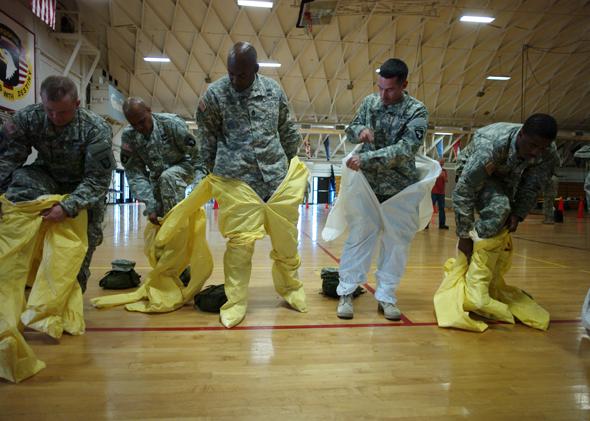Some 3,500 to 4,000 American troops are being deployed to Liberia to help efforts to quell the Ebola outbreak devastating the region. The American operation is the largest military foreign aid effort in the region to fight Ebola: Congress has so far approved $750 million for the mission, and about 600 military personnel are already on the ground. Great Britain plans to send 750 soldiers, and Germany and France have been committing some airlift support since September in a joint effort. Stopping Ebola in West Africa is an immediate need, and also key to preventing the virus from spreading to other regions. How are American troops training for their deployment, and what will they be doing once they arrive in Liberia? And how does the military plan to prevent them from contracting Ebola, or transmitting it on their mission or when they return home?
Soldiers with the 101st Airborne at Fort Campbell, Kentucky, began deploying last week. More of their comrades will be joining them through the end of the month. In preparation, they received medical briefs, just as they do before any overseas mission. They undertook a two-week, 14-session course to prepare specifically for Ebola, beginning with lessons on what it is, how it’s spread, and what its symptoms are. Troops then learned how to don personal protective equipment used to avoid contact with the virus, and how to take it off in the proper order. Each soldier practices the process, is tested on her knowledge, and is specially fitted for an impermeable Tyvek suit to “ensure that there is enough range of motion to carry out what we need to do” without ripping them or being hampered, says Lt. Col. Brian DeSantis of the 101st Airborne. Refresher courses will be given throughout the mission.
Combating an epidemic outbreak was never something DeSantis thought he would do as part of the American military, he told me. His previous four deployments were to the Middle East. The lieutenant colonel admits there was some apprehension about the Ebola-fighting mission among his comrades at first, but he says the training has dispelled them. An Army medical brief given to soldiers’ families helped calm nerves, too, though explaining Ebola to his children proved a little harder at first. But “once they got it, it was more about making sure they had the right address to send letters to,” says DeSantis.
Though troops are prepared to suit up to keep them from contracting Ebola, the scope of the military operation is intended to limit their direct interaction with patients. Their mission is to help build infrastructure and care facilities and to work with public health organizations on transportation. The U.S. Agency for International Development, the World Health Organization, and the Liberian government are taking on more of the responsibilities of training local communities and public health workers and testing, isolating, and treating patients.
Temperatures will be checked throughout the deployment. After completing their duties, military personnel will be monitored for an additional period of time (though DeSantis was unsure for how long, as it would depend on where a soldier had been and what he’d been doing) and screened before leaving Liberia to return home. Upon arriving back, they will be monitored for 21 days, the length of virus incubation.*
It is an ambitious operation, says Steve Morrison of the Center for Strategic and International Studies, a defense and international policy think tank. A military mission to tackle this kind of outbreak is unprecedented, though American military support has been involved in aid and infrastructure in the region before. U.S. military-backed arms, humanitarian, and engineering training in West Africa has been taking place for the past 25 years; PEPFAR, a continentwide HIV/AIDS relief program that began under George W. Bush in 2003 (and continued under Obama) has involved the Department of Defense from the beginning.
“Medical diplomacy” is a term that has been in vogue among public health, defense, and policy wonks for a decade, says Morrison. The U.S. military was involved in bringing airlift support, infrastructure, and public health aid to Indonesia after the Indian Ocean tsunami in late 2004. According to a 2006 poll conducted by Terror Free America, an anti-extremist nonprofit group (its chairs include Sens. John McCain and Bill Frist, both great believers in American military might), it may have paid diplomatic dividends, too: It found that Indonesians’ support for the United States rose and stayed high for at least a year after the tsunami aid. A report from Pew about attitudes in Indonesia, Japan, and Pakistan after U.S. aid delivery during natural disasters suggests the same. Other experts, however, have been skeptical of the militarization of humanitarian aid and its dangers.
Questions remain over who will staff the medical facilities the military will be building and how the mission in Liberia will be handed off to local officials once complete. There is debate and criticism over military engagement in fighting Ebola—in particular whether it is putting American soldiers at unacceptable risk, whether the influx of foreign military aid undermines local autonomy and long-term success, and whether a military presence erodes the humanitarian nature of fighting disease. Yet this deployment fits into a larger theme of public health intervention, which has become increasingly important to American diplomatic and military strategy. “There has definitely been a shift in how we think of health,” says Jeremy Youde of the University of Minnesota–Duluth. Public health has moved from a low-politics issue to one that shapes thoughts on national security and foreign relations. It will loom large in American humanitarian interventions (military and otherwise), in Africa and everywhere else.
Read more of Slate’s coverage of Ebola.
Correction, Oct. 20, 2014: This article originally misstated that troops would self-monitor for 21 days upon returning to the U.S. postdeployment. They will be monitored by Defense Department personnel postdeployment. (Return.)
